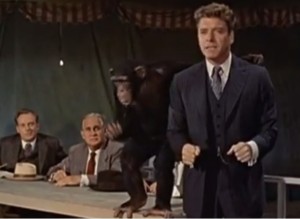“It was lamentable to see this broad young man, who would have been so happy in the prize-ring, the fish-market, or the stock exchange, poking through the cobwebbed corridors of Terwillinger.”
 The broad young man is Elmer Gantry, eponymous hero of Sinclair Lewis’s classic 1927 novel; and Terwillinger is the estimable Baptist college in Kansas where Elmer is finagled, flattered, and guilted into a career as a born-again fundamentalist preacher—though his adventures take him beyond the Baptists to big-tent evangelism, New Thought, and eventually the Methodists, with some time off to sell farm implements. Elmer’s picaresque journey is through the religious landscape of the early 20th century, but the pious hypocrisies so neatly skewered by Sinclair Lewis will never go out of date.
The broad young man is Elmer Gantry, eponymous hero of Sinclair Lewis’s classic 1927 novel; and Terwillinger is the estimable Baptist college in Kansas where Elmer is finagled, flattered, and guilted into a career as a born-again fundamentalist preacher—though his adventures take him beyond the Baptists to big-tent evangelism, New Thought, and eventually the Methodists, with some time off to sell farm implements. Elmer’s picaresque journey is through the religious landscape of the early 20th century, but the pious hypocrisies so neatly skewered by Sinclair Lewis will never go out of date.
Elmer Gantry is a hypocrite, a philanderer, a poseur, a slick, selfish and sanctimonious bastard. His stock  sermon is plagiarised from an essay by Robert Ingersoll. He is not a sociopath, however; he is human enough to maintain a tiny stock of sympathy in the reader, even as his sins and deceits mount up. Slung out of the Baptist ministry before he even graduates from divinity school, for reasons that are too hilarious to summarize, our hero spends a couple of years on the road as a travelling salesman, drinkin’ and smokin’ and cussin’ and having not a bad time—but he misses the magic of the pulpit. Then Fate boots him in the butt again; he joins the entourage of the beautiful evangelist Sharon Falconer, a kind of slimmer Aimee Semple McPherson, whom he worships with the only true passion of his life.
sermon is plagiarised from an essay by Robert Ingersoll. He is not a sociopath, however; he is human enough to maintain a tiny stock of sympathy in the reader, even as his sins and deceits mount up. Slung out of the Baptist ministry before he even graduates from divinity school, for reasons that are too hilarious to summarize, our hero spends a couple of years on the road as a travelling salesman, drinkin’ and smokin’ and cussin’ and having not a bad time—but he misses the magic of the pulpit. Then Fate boots him in the butt again; he joins the entourage of the beautiful evangelist Sharon Falconer, a kind of slimmer Aimee Semple McPherson, whom he worships with the only true passion of his life.
Sharon, who is certifiably nuts, has a penchant for private pagan ceremonies centered around herself as the personification of a number of goddesses. At the same time, she is a grasping businesswoman, who ruthlessly milks the towns visited by her revival circus; she is a saver of souls and a faith-healer of bodies, with a hundred gimmicks up the collective sleeves of her entourage; and she is a charismatic sociopath with delusions of grandeur:
She saw herself another Mary Baker Eddy, an Annie Besant, a Katherine Tingley…Elmer Gantry was shocked when she hinted that, who knows? the next Messiah might be a woman, and that woman might now be on earth, just realizing her divinity.
Naturally Sharon pays the price of her hubris, while Elmer—adrift once more—eventually washes up on a Methodist beach. His career as a preacher finally prospers, until he stumbles back into sin despite his best and most fervent intentions, and what happens then…but that would be telling. Suffice it to say that Lewis sprinkles his narrative with some of the funniest set-pieces ever written, and the feast of satire only finishes when the book does.
There have been a number of adaptations of Elmer Gantry, as a play, as an opera, and as a successful movie made in 1960, with Burt Lancaster in the title role. Highly touted as the movie was, however, it is no substitute for the book: it covers only a small portion of Elmer’s career, turns Sharon Falconer from nutsy conwoman to plaster saint, and woefully slanders a couple of other defenceless characters. Worst of all, it misses the point. Burt Lancaster’s Gantry is an anomaly, cynically abusing a religious culture that is basically honest and above-board. Sinclair Lewis’s Gantry, in contrast, is typical—and far from abusing the religious system, he settles into it as his proper milieu, like a slimy catfish in a rather unsavory pond.

Note: I will be featuring a few more classics of atheistic or skeptical fiction over the next little while; but for those who are interested, my colleague Damion Reinhardt has been compiling a most intriguing booklist over at Background Probability, in his Friday Reads column.
